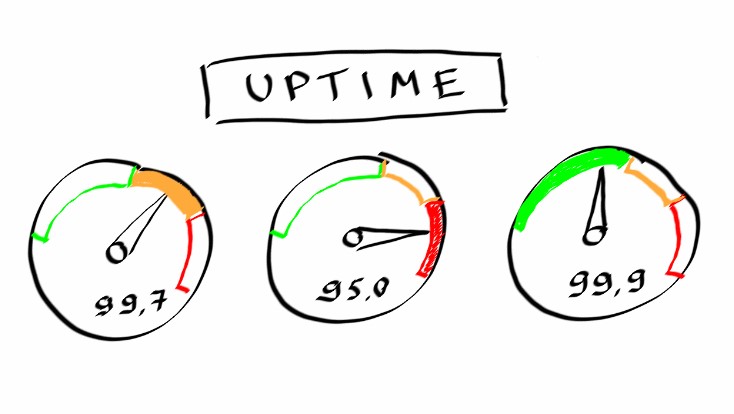Server uptime is a measure of how long a server has been online without any downtime. This is an important metric to consider when running a website, as it can affect the availability of your site, which in turn affects the user experience. In this blog post, we’ll break down what server uptime is and why it’s important for businesses.

How Is Server Uptime Calculated?
Server uptime is generally expressed as a percentage. This percentage is calculated by subtracting the time that your server was offline from the total amount of time that it was supposed to be online. For example, if your server was online for 10 hours and offline for 2 hours during one day, then its server uptime would be 80%. It’s important to note that server downtime can include anything from scheduled maintenance windows to unexpected outages caused by hardware or software failure.
Many hosting providers offer different levels of service depending on how much uptime they guarantee their customers. Generally speaking, most reliable hosting companies guarantee an uptime of at least 99%. It’s worth noting, however, that even with a 99% guarantee there will still be some downtime throughout the year due to unforeseen circumstances such as power outages or network issues.
What Are The Benefits Of Having High Server Uptime?
Having high server uptime helps businesses ensure their websites are always available to customers so they can access information about products or services offered by the business. Additionally, having low downtimes also ensures that any transactions made on the website are done securely and quickly. This helps improve customer satisfaction because customers have access to what they need in a timely manner.

High server uptime also decreases financial losses caused by downtime due to lost sales opportunities or decreased traffic from customers who have had negative experiences with slow page loads or errors when trying to access your website. It also prevents potential legal issues that could arise from outages caused by data breaches or other security incidents. Finally, high server uptimes help businesses maintain an efficient workflow since employees can quickly complete tasks without waiting for pages to load or dealing with other technical issues caused by outages.
Server uptime is an essential metric for businesses because it measures how long their servers are online without any downtime. Having high server uptimes helps improve user experience and customer satisfaction while preventing potential legal issues and financial losses due to downtime. Additionally, high server uptimes ensure efficient workflows since employees can quickly complete tasks without waiting for pages to load or dealing with other technical issues caused by outages. Overall, understanding what server uptime is and why it’s important will help businesses better manage their websites so they can provide quality service and products to their customers.
Monitoring server uptime is an essential task for any website owner or administrator who wants to ensure their site remains accessible 24/7/365. By understanding what server uptime is and how it’s calculated, you’ll be better able to assess whether or not you’re getting the level of service you need from your hosting provider. With this information in hand, you’ll also be better equipped to make more informed decisions regarding which hosting provider best meets your needs and budget requirements going forward.

